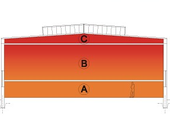A number of important factors influence the design of heating of large-scale buildings. It depends on the way of heating, the dimensions of the building, the influence of technology and the location of the energy equipment. The key is how these factors affect the thermal comfort of a person.
